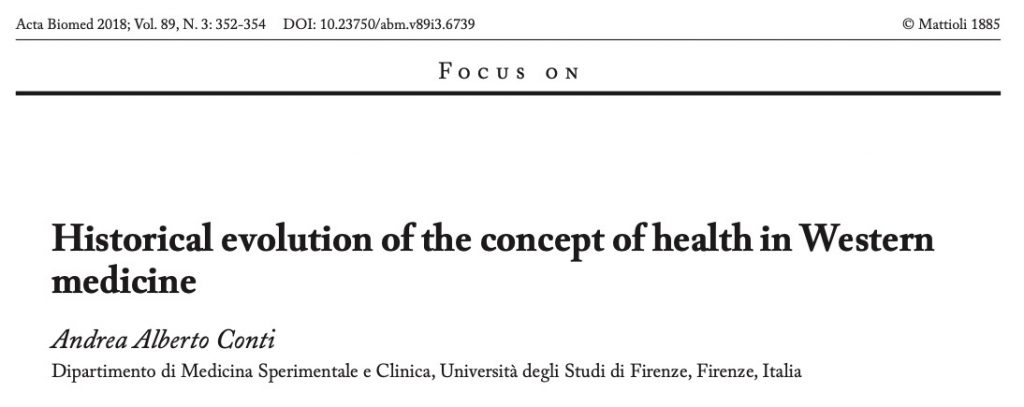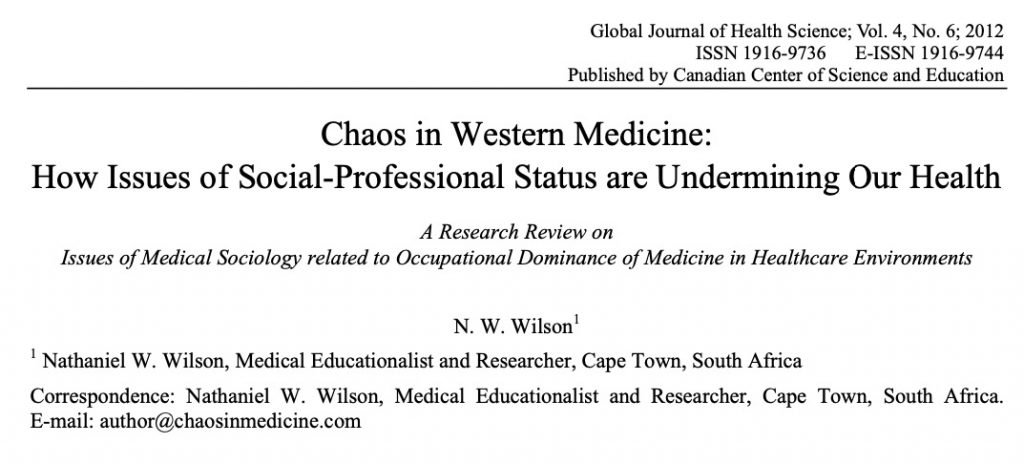

This study begins with the definition of health given by the World Health Organization (WHO) in 1946, which came into force in 1948 after the signature of an official document by 61 states. The WHO stated that “health is a state of complete physical, mental and social well-being and not merely the absence of disease or infirmity”. Having established this cornerstone of the definition of health, the author goes back to the so-called origins of Western medicine, traditionally attributed to Hippocrates and the school that continued to work on his thought and ideas of health and healing. He then describes the definitions or how health was conceived by some physicians in the Renaissance (XIV-XVIII centuries) and covering the XIX and XX centuries without much detail and ending with the definition of the WHO.
What I found in this article is that the topic described in the title “Historical evolution of the concept of health in Western medicine” is impossible to be covered in a single research paper. After reading the article, I think that the title does not give a clear objective. This is to me the most important thing that is lacking. Then, whatever the author states or explains could be interesting, but the reader does not know what the author wants by going through the history of the concept of health. I would say that he should have chosen only one aspect to analyze in this historical evolution and explain if there were changes or not.
The other problem I find is that since there was no clear objective, one can read some authors who gave definitions of health throughout history, but the readers can ask themselves: why did the author choose these authors and not others? Even more, it could be a bias because the author (with Italian surname) mentions two Italian doctors, two Germans, one French and all of them Europeans, but any American for example.
Since there is no clear objective, the conclusions are too general. But I also think it is a useful article for my final paper, because in a few pages I can have an overview of the concept of health, so I can learn from what the author describes, have more ideas on how to organize my paper, and continue to understand where I can contribute to the understanding of Western medicine when writing my paper.
The author is writing for an audience that could be interested in this topic and I think that publishing this article in this journal was a good choice.
Conti, A. A. (2018). Historical evolution of the concept of health in Western medicine. Acta Biomed, 89(3), 352-354.

In this article, the author describes what complementary and alternative medicine is. He gives a historical background, explaining that the adjectives complementary and alternative were used because there was an established or orthodox medicine that was a point of reference. Then he gives the current definitions of complementary and alternative medicine and the debate that goes round this topic. He introduces the concepts “natural”, “soft”, and “holistic” as essential components of these two types of medicine. Having given this basis, he compares the two types of medicine with Western medicine.
I think that this research paper has a very solid structure, is readable and goes from a very clear objective to a conclusion that satisfies the reader (my personal opinion). However, one thing that I find quite confusing is that the author mentions in the title the term Western medicine but when he compares complementary and alternative medicine with “Western medicine” he uses the term “Evidence-based medicine”, but nowhere in the article he specifies that Evidence-based medicine is the same as Western medicine.
What I find interesting about this article is that the author assumes that the reader knows that evidence-based medicine and Western medicine are synonymous. However, this is one of my main arguments for the final paper. First, because sometimes we write papers assuming that readers know things that we are not sure about and can be very vague when writing. Second, because I think that in this case evidence-based medicine is a more appropriate term for what we know as western medicine than the term western medicine itself.
Having this in mind, I think that strictly I could not use this article to talk about Western medicine, but about evidence-based medicine.
This article is a chapter from the Handbook of the Philosophy of Medicine and in my opinion, the publication of this content in this book was very appropriate. This article gave the Handbook a broader perspective of what medicine could be.
Louhiala, P. (2017). Complementary and Alternative Medicine (CAM) and Its RelationshiptoWesternMedicine. In T. Schramme & S. Edwards (Eds.), Handbook of the Philosophy of Medicine. Springer.

This article is more the opinion of the author about what he thinks about Western medicine. He finds some literature to support the ideas he has and gives a detailed overview of what constitutes a chaos in Western medicine. The author is mainly worried about equity in healthcare around the world. He describes from his point of view how the medical profession and the system that qualifies doctors to be doctors acquired some kind of power in society and the effects of it.
My main critique to this article is that I think that this is another example of what I mentioned for the second article: one thing that I find quite confusing is that the author mentions in the title the term “Western medicine” but when he describes the chaos in “Western medicine” he uses the term “Orthodox medicine”, but nowhere in the article he specifies that “Orthodox medicine” is the same as “Western medicine”. At the beginning he mentioned “Western orthodox medicine”, but he did not explain that “Western orthodox medicine” is the same as “Orthodox medicine”.
What I also find difficult to understand in academia is when to take a more personal approach to a topic and when to write more academically. In this article, the author gives many of his personal thoughts without any quotes or evidence. He just mentions his thoughts. For example, he says: “It is often believed, from a background of religion, that a western doctor is a most important part of your life, as important as your religion”. But that is what he thinks. He does not cite any study to support this statement. The article was published in the Global Journal of Health Science, and it is assumed that the articles we can find in this journal are scientific. However, this article describes the author’s opinion rather than the results of scientific research.
What I find thought-provoking about these types of articles is that in this case the author is questioning the status quo of medicine and not many people will do that. I found this article very useful for my final paper and dissertation because in a way I am also questioning many things about how we take many things for granted and just act automatically without questioning them. The author is very concerned that there will be continued resistance to positive change to significantly improve global health status, and that scientific evidence will be very difficult to find.
After reading the scope of the journal, I think this article is in the right place. However, I would say again that it is a more scientific journal, and this article has more personal opinions than results obtained from research.
It does not mean that the article is not interesting, it is! And not useful, because it is! However, was it not supposed to give more scientific evidence to what he is saying in the article? I raise this question to the group.
Wilson, N. W. (2012). Chaos in Western Medicine: How Issues of Social-Professional Status are Undermining Our Health. Global Journal of Health Science, 4(6). https://doi.org/10.5539/gjhs.v4n6p1


Carlos –
The lack of definitions is confusing. More so is the implication that only Western medicine is based on evidence – which is a word that needs to be defined as well. Most traditional medical frameworks treat a person in a specific cultural context; however, their choice of treatment is based on how the patient is presented to the practitioner. Is this not also “evidence” of the disease? If so, then one can argue that traditional medicine and Western medicine are both evidence-based, and that the separation of the two modalities requires a re-assessment!
Hey Carlos! I think it’s very odd that a theme in these articles is lack of definitions, and fairly important ones at that! I wonder why that is? Do you think that the lack of structure or definition makes these articles less accessible, or could cause confusion to a certain audience of readers? I can see the first one, while being more general, as potentially more accessible from what you’ve said, but I feel like these issues could lead to a lack of understanding which creates more questions than answers. Questions are always beneficial, but it’s always off-putting when articles don’t make things clear and tighten up their purposes.
Hi Paige,
Yes, you’re right. It is strange. But I think it’s because we (specifically these authors) take for granted what these things are. And I think that sometimes we don’t need definitions, as we discussed in the last class, but when I want to clarify or criticize something, I would expect a definition so that we have things clearer in the end.